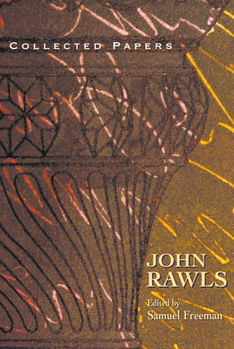Collected Papers
Select Format
Select Condition 
Book Overview
John Rawls's work on justice has drawn more commentary and aroused wider attention than any other work in moral or political philosophy in the twentieth century. Rawls is the author of two major treatises, A Theory of Justice (1971) and Political Liberalism (1993); it is said that A Theory of Justice revived political philosophy in the English-speaking world.
Format:Paperback
Language:English
ISBN:0674005694
ISBN13:9780674005693
Release Date:March 2001
Publisher:Harvard University Press
Length:672 Pages
Weight:2.15 lbs.
Dimensions:1.7" x 5.9" x 9.2"
Customer Reviews
2 ratings
great book
Published by Thriftbooks.com User , 17 years ago
The best of Rawls in a fine edition. Great book to read.
Engaging look at Rawls' lifework
Published by Thriftbooks.com User , 24 years ago
Rawls' doctoral dissertation, completed at Harvard in 1951, sketched a procedure for adjudicating certain political and moral conflicts. Twenty years later he parlayed this procedure into his famous elaboration of social contract theory, his conception of "justice as fairness." This idea marks the heart of Rawls' _A Theory of Justice_, the most important and influential work of political philosophy of the twentieth century. His central thesis, that a conception of justice as fairness would be accepted by all members of liberal constitutional democracies, motivated Rawls' justly-celebrated philosophical defense of democratic liberalism. In _Political Liberalism_ (1993), Rawls deepened his philosophical analysis by articulating an even broader principle, that of "public reason," which he believes is the shared basis for justifying (among other things) liberty of conscience, freedom of thought, and toleration of difference within liberal societies. Most recently, in _The Law of Peoples_ (1999), Rawls has stretched the social contract yet further by defending an even more general philosophical principle, that of the "just law of peoples." Just as the liberal principles of justice of fairness and public reason allowed him to develop complex theories about political relations within liberal democracies, Rawls believes that, because it would be acceptable to both constitutional liberals and members of certain illiberal societies, this new principle forms the basis of a social contract more inclusive than those of his earlier treatises. Rawls' vision of a realizable near-utopia emerges through his beautiful theoretical elaborations of a social contract theory that takes his principles--as well as the existence of a world burdened with outlaw states, crushing poverty, and problematical absolutism--utterly seriously.Rawls' _Collected Papers_ brings together nearly all of his major and minor shorter publications on these and related issues. Many essays explore in greater depth issues raised by critics of _A Theory of Justice_ and _Political Liberalism_, and all of them together paint a fascinating portrait of Rawls' philosophical development between 1951 and the present.





